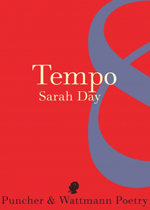
Tempo by Sarah Day
Puncher & Wattmann, 2013
There is much poetry about currently which does not value rhythm and music as integral to its sense. Day’s poetry absolutely does; filled with assonance and internal rhyme which renders many individual lines beautiful and suggestive. The first poem, ‘El Iskandariya’ is one of the best, capturing a moment without labouring it:
When marsh birds pooled out of the sky like ink on water to devour the barley flour that Alexander’s men had laid to mark the city’s boundaries, the hour seemed lost beyond recall ... (p. 1)
There are numerous passages of such beauty and mystery in many of the poems: Day’s feeling for language and ear for sound have been apparent since her first book, A Hunger to Be Less Serious. What’s missing in Tempo is concision, pressure, and more than a little boldness or surprise, in thinking or language. Many poems begin with energy: first lines are frequently the best, promising strangeness:
‘The shadow trees arrive in handcarts and on the backs of trucks.’ (Shadow Trees, p. 20)
‘The guides are here now: your valets their government car is parking outside’ (Palliative, p. 54)
‘The garden, lit up in a realm that’s not the days, flickers in an instant outside time.’ (Lightning in a Portuguese Garden, p. 13)
But many poems proceed in not unpredictable ways, their ‘tempo’ strolling at a pedestrian pace. Slackening, or taming their wild beginnings, they tend to space image upon simile, covering a distance in six or eight lines which might be more interestingly travelled in two or three. Many, particularly those using rhyming forms, tie up their loose ends rather tightly, arriving at some too pat conclusions. Some poems, ‘El Iskandariya,’ ‘Lightning in a Portuguese Garden’, ‘Hierophant’ ‘The Mirror,’ do fulfil their promise, escaping a persistent urge, elsewhere, to over-explain. In ‘Rowan,’ Day comments:
... it is hard to say at what point the sense of something impending comes close to breaking (p. 39)
Breaking-point – when the subject and language cannot bear the weight of any more elaboration, describing or slant moralising – seems to come earlier in the poems than their endings. Consider, for example, if the rather good poem ‘In Time, Pompeii’ (p.3) which takes the reader on a walk through the frozen town, looking at corpses and friezes, had finished at the bottom of its first page, with the taught and teasing ‘Now, as then/ Cupid rides a crab and parrots dine with doves’ rather than after another whole page, with the plodding and over-obvious ‘I . . . await the crowded train/ with its noisy freight of twentieth century/ passengers bound for Naples’.
I don’t think this merely a question of style. Brevity is not a god: poetry can elaborate, wonderfully, baroquely, exponentially, in many modes – Christopher Smart, Ginsberg, Ammons – but Day’s use of diction and thinking in Tempo are both too low-key to sustain all the words. Quiet, lyrical, observational free verse which addresses Day’s subjects – the natural world, art and the domestic in time, and the place of observer within it – can be ambitious, even revelatory, when handled with more subtlety and a feeling for when to stop. Think of Robert Gray or Sarah Holland-Batt, to name only two very disparate contemporaries.
Of the rhyming poems, ‘New Years Eve,’ (p. 2) is startlingly twee. Straining in its pentameter, it ends:
A view from elsewhere in our galaxy could show how we appear from the outside, might illustrate the poignancy – that we’re all in this together for the ride, as round about the sun we go again like passengers that don’t get off the train.
Within the light, wry, ironical treatment of the cosmic material, the clunkiness of the rhyme may be intended for comic effect, and a reader might see justice in the final couplet’s simile. That is, provided that the train in question is on a loop, rather than a line which reverses its direction, as most railways do, at least in Australia. But what about the passengers? Are we supposed to speculate why they don’t disembark? Nobody on a train doesn’t get off eventually. Is a long implication being drawn that we will, in fact, ‘get off’? Where? Or is it the Earth-train itself which might fly off into intergalactic space? The mind boggles but not much insight is gained. The couplet is neat only if you really don’t think about it. Lightness and wryness can be effective, when there’s something weighty behind them, or something interesting on their language surface.
And then we discover something excellent like ‘The Mirror’ (p. 19)
... There was a mirage of bluebells. It was still raining. They mystery of how a piece of furniture got to be among the river stones was not a burning question. When we ran, we ran towards and away from a reflection, a glimpse through bubbles of what we’d come to see as imminence or constancy in motion.
One of the things that the complexity of a good poem does is to leave a residue for the reader. Not overloaded with elaboration, description, or euphonious allusion, the mirror remains multiplicitously suggestive – the image retains an excess, beyond any paraphrasable meaning. Its reflection, with its weird aura of child-hood and screen-memory, has stayed with me for weeks, and will for years. It’s a shame that a poet capable of such heights is not working more consistently at that level.









